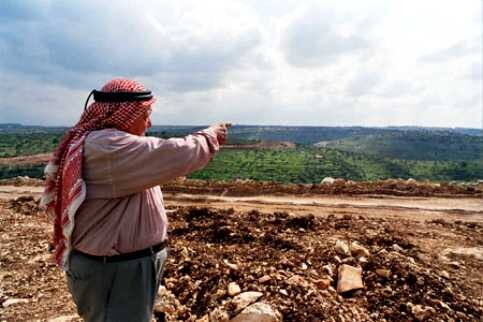Palestinian Center for Human Rights 13 October 2003

Palestinian farmer showing his land in Jayous (Photo: PENGON, 2003)
The Palestinian Centre for Human Rights (PCHR) condemns the actions of Israeli occupying forces who are currently holding approximately 70 Palestinian farmers from the village of Jayous, northeast of Qalqilya, against their will. For the last nine days, the farmers have been detained on the western side of the Israeli separation barrier, opposite the village. Israeli occupying forces have denied the individuals the right to return to their homes in Jayous. The farmers were stopped by Israeli soldiers when they attempted to return from their lands which lay to the west of the village, between the Israeli separation barrier and the Green Line.
PCHR expresses deep concern regarding the conditions of the farmers in Israeli custody, particularly the lack of food and shelter available to the detainees. PCHR calls upon the international community to intervene on behalf of those apprehended by forcing the Israeli occupying forces to release the farmers and allow them future unfettered access to their lands. Further intervention is warranted to address the systematic measures taken by the Israeli occupying forces isolating West Bank farmers from lands that lie west of the separation barrier.
According to PCHR investigations, in the early hours of Sunday, 5 October 2003, 30 families from the village of Jayous, northeast of Qalqilya, accessed their lands through the western gate of the separation wall. After gathering their crops, they started to return to the village. However, Israeli occupying soldiers positioned at the gate stopped the families and ordered them to return to their lands until 6 October.
Members of the Palestinian families made repeated attempts to pass through the gate, but Israeli soldiers refused to grant them access to their village. The Israeli occupying forces eventually allowed the women and children to pass while approximately 70 male Palestinian farmers were denied access and are being held between the Green Line and the separation wall.
PCHR’s fieldworker in the northern West Bank was able to reach one of the apprehended farmers, Sharif ‘Amr, via telephone. ‘Amr informed PCHR that the farmers are suffering from lack of provisions, and are completely reliant on the crops from their lands for food. ‘Amr also reported that on Saturday, 11 October 2003, 2 delegates from the International Committee of the Red Cross succeeded in providing the detainees with some provisions. He also explained that the farmers are forced to sleep outdoors in their fields and stressed that this arbitrary Israeli action has resulted in a significant loss of crops.
It is noted that the separation barrier resulted in the de-facto Israeli annexation of 9000 dunums of Palestinian land which legally belong to residents of Jayous. This land now lies on the western side of the separation barrier, along the Green Line separating the West Bank from Israel.
Palestinian landowners can only access their lands by passing through a single gate controlled by the Israeli occupying forces. Israeli soldiers constantly monitor the entry and exit of farmers through this gate and have frequently denied residents of Jayous access to their lands.
Also, this week Israeli occupying forces prevented thousands of farmers from the West Bank towns of Jenin, Tulkarem and Qalqilya from passing through the gates built in the separation barrier. These Israeli imposed closures have been a constant occurrence this month and have significantly undermined the ability of Palestinian farmers to reach their lands.
October marks the beginning of the olive harvest and is a particularly important period for Palestinian farmers. Israeli arbitrary measures preventing farmers from reaching their olive orchards threaten to seriously impact the harvest. Many Palestinian families in the area rely on these crops as their primary source of income for the entire year.
PCHR asserts that the actions of Israel forces preventing the 70 Palestinian farmers from reaching their homes is a form of collective punishment prohibited by article 33 of the Fourth Geneva Convention of 1949, relative to the protection of civilians in a time of war. PCHR reminds the international community of its legal obligation to enforce the terms of the Fourth Geneva Convention.
Furthermore, the ongoing silence of the international community, specifically the High Contracting Parties to the Fourth Geneva Convention and the failure to intervene to ensure protection for the Palestinian civilian population has served to encourage further violations of international human rights and humanitarian law. Thus, PCHR calls upon the international community to take immediate steps to ensure the protection of the Palestinian civilian population in the OPT.
Related Links: